Unit 7 Will people have robots?知识清单+练习(含解析)
文档属性
| 名称 | Unit 7 Will people have robots?知识清单+练习(含解析) |
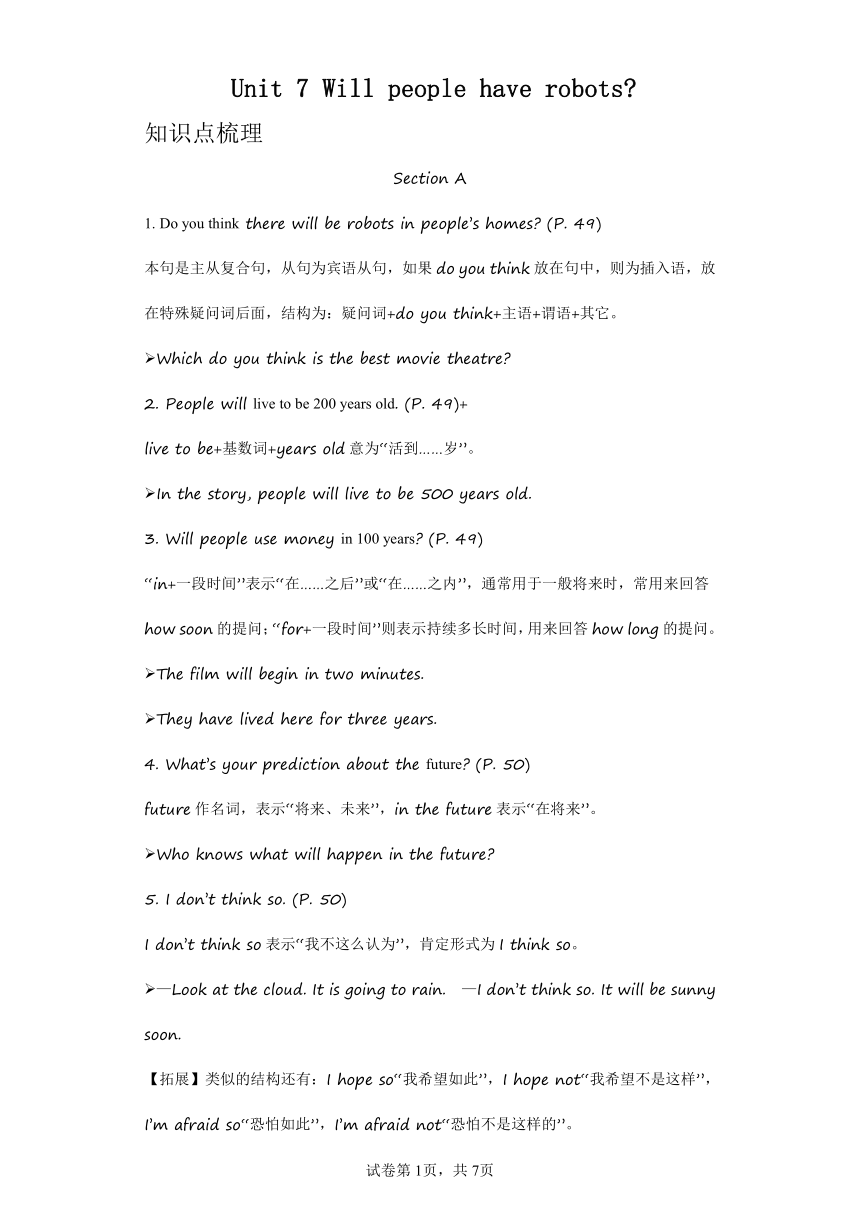
|
|
| 格式 | docx | ||
| 文件大小 | 28.7KB | ||
| 资源类型 | 教案 | ||
| 版本资源 | 人教新目标(Go for it)版 | ||
| 科目 | 英语 | ||
| 更新时间 | 2023-11-26 00:00:00 | ||
图片预览

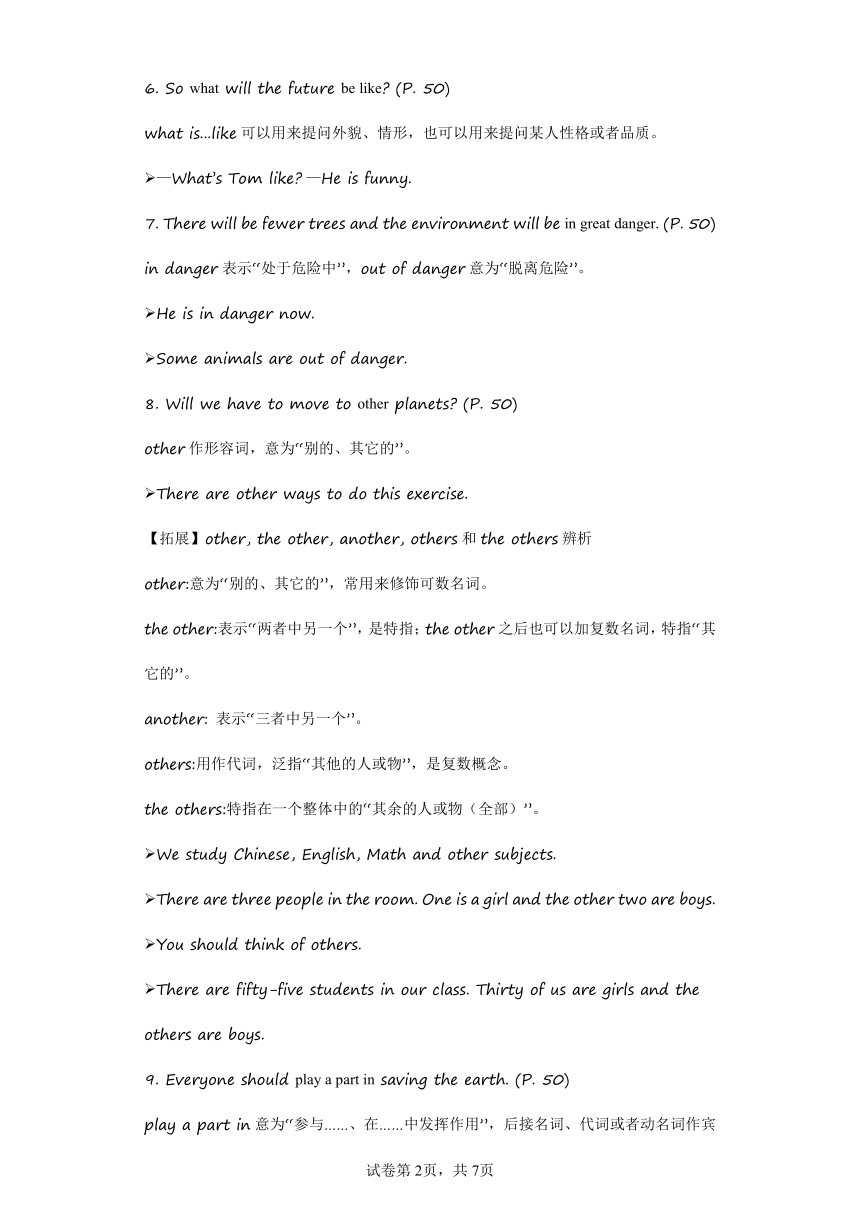
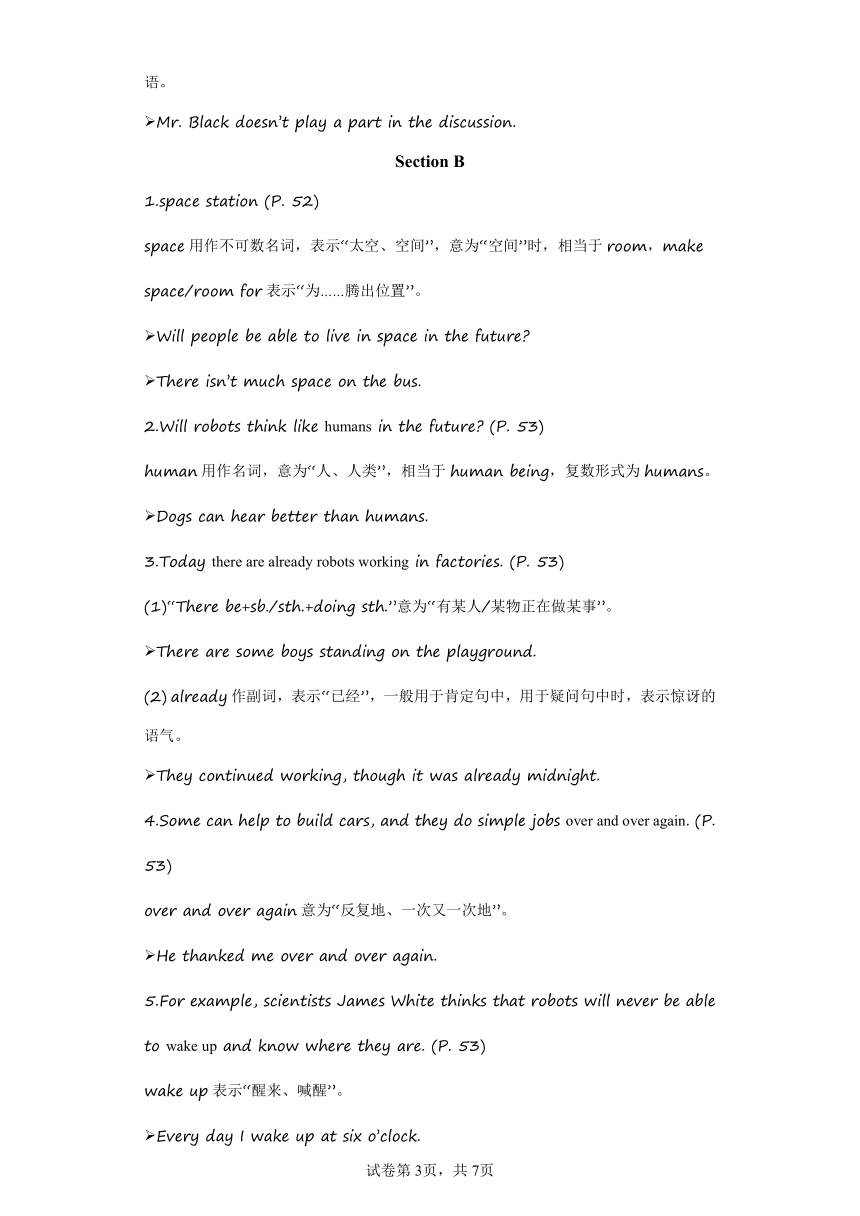
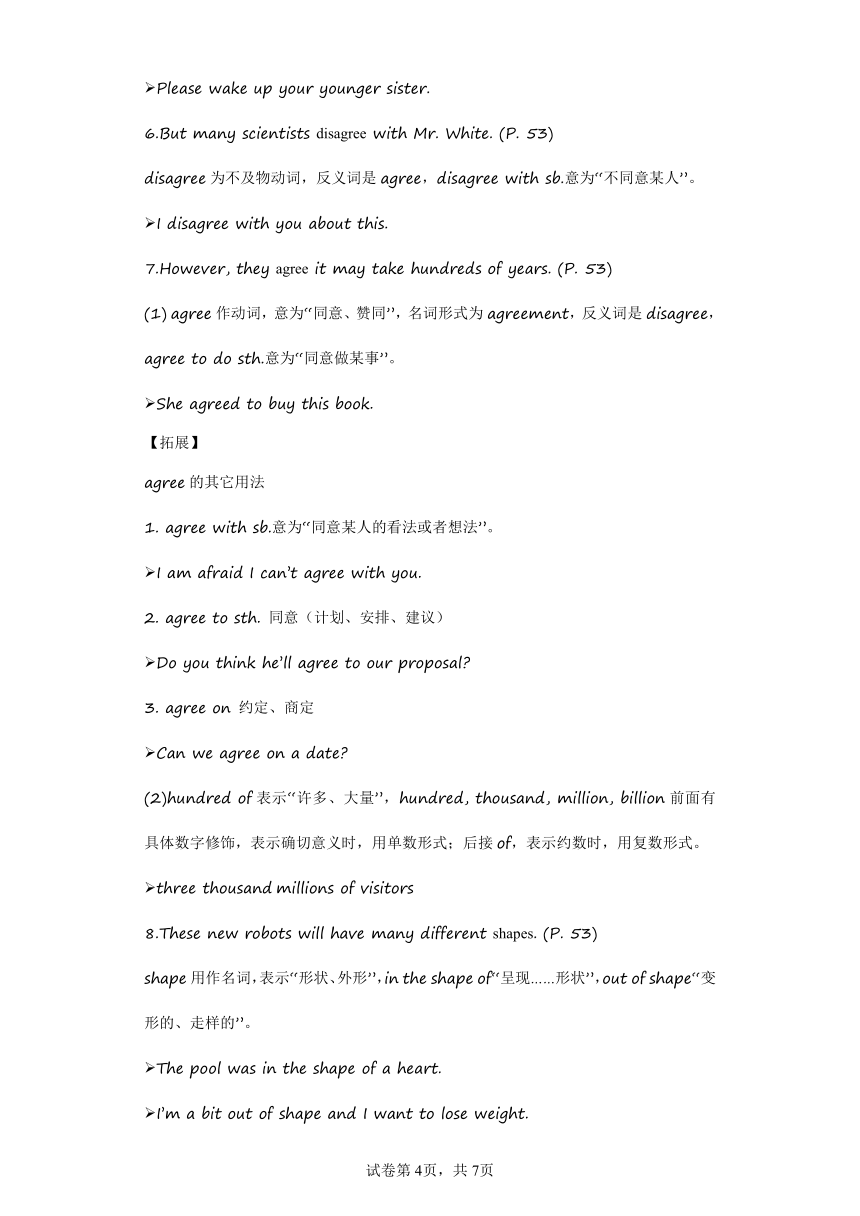
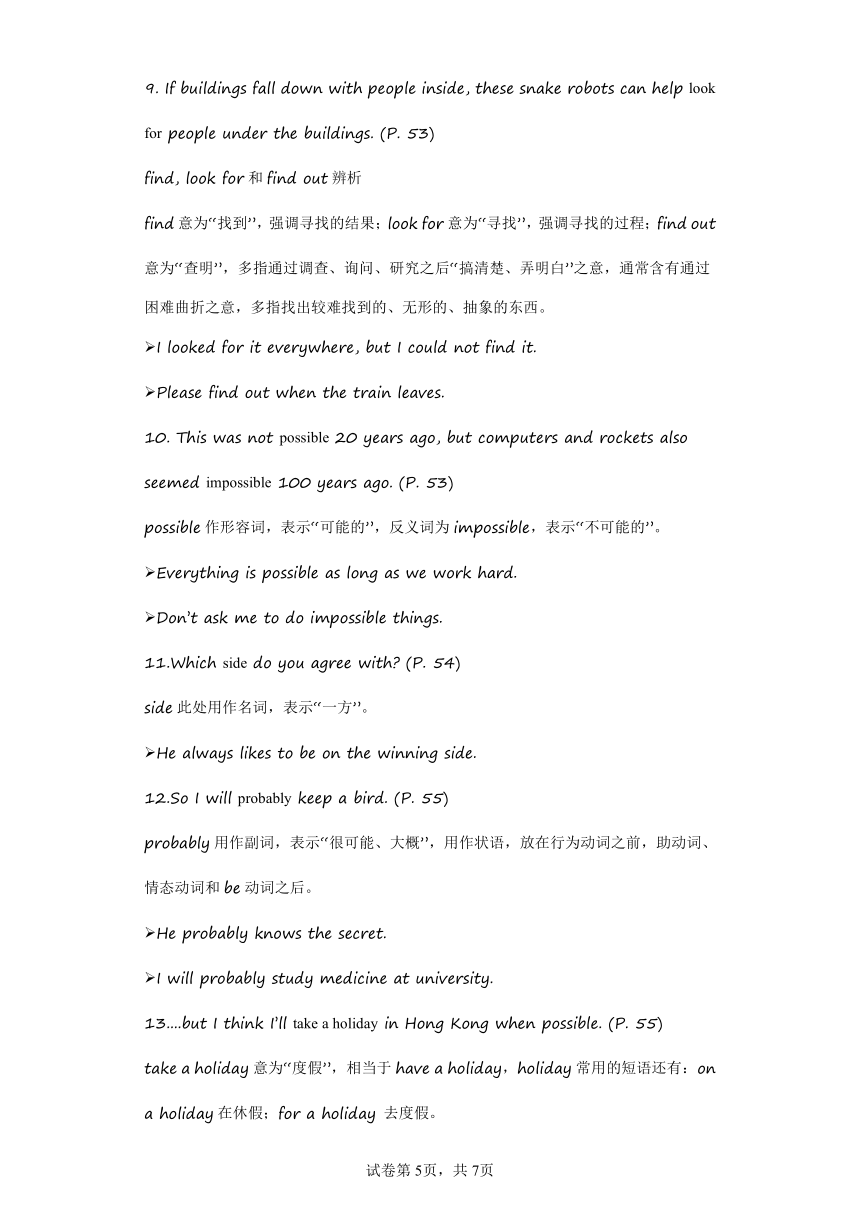
文档简介
Unit 7 Will people have robots
知识点梳理
Section A
1. Do you think there will be robots in people’s homes (P. 49)
本句是主从复合句,从句为宾语从句,如果do you think放在句中,则为插入语,放在特殊疑问词后面,结构为:疑问词+do you think+主语+谓语+其它。
Which do you think is the best movie theatre
2. People will live to be 200 years old. (P. 49)+
live to be+基数词+years old意为“活到……岁”。
In the story, people will live to be 500 years old.
3. Will people use money in 100 years (P. 49)
“in+一段时间”表示“在……之后”或“在……之内”,通常用于一般将来时,常用来回答how soon的提问;“for+一段时间”则表示持续多长时间,用来回答how long的提问。
The film will begin in two minutes.
They have lived here for three years.
4. What’s your prediction about the future (P. 50)
future作名词,表示“将来、未来”,in the future表示“在将来”。
Who knows what will happen in the future
5. I don’t think so. (P. 50)
I don’t think so表示“我不这么认为”,肯定形式为I think so。
—Look at the cloud. It is going to rain. —I don’t think so. It will be sunny soon.
【拓展】类似的结构还有:I hope so“我希望如此”,I hope not“我希望不是这样”,I’m afraid so“恐怕如此”,I’m afraid not“恐怕不是这样的”。
6. So what will the future be like (P. 50)
what is...like可以用来提问外貌、情形,也可以用来提问某人性格或者品质。
—What’s Tom like —He is funny.
7. There will be fewer trees and the environment will be in great danger. (P. 50)
in danger表示“处于危险中”,out of danger意为“脱离危险”。
He is in danger now.
Some animals are out of danger.
8. Will we have to move to other planets (P. 50)
other作形容词,意为“别的、其它的”。
There are other ways to do this exercise.
【拓展】other, the other, another, others和the others辨析
other:意为“别的、其它的”,常用来修饰可数名词。
the other:表示“两者中另一个”,是特指;the other之后也可以加复数名词,特指“其它的”。
another: 表示“三者中另一个”。
others:用作代词,泛指“其他的人或物”,是复数概念。
the others:特指在一个整体中的“其余的人或物(全部)”。
We study Chinese, English, Math and other subjects.
There are three people in the room. One is a girl and the other two are boys.
You should think of others.
There are fifty-five students in our class. Thirty of us are girls and the others are boys.
9. Everyone should play a part in saving the earth. (P. 50)
play a part in意为“参与……、在……中发挥作用”,后接名词、代词或者动名词作宾语。
Mr. Black doesn’t play a part in the discussion.
Section B
1.space station (P. 52)
space用作不可数名词,表示“太空、空间”,意为“空间”时,相当于room,make space/room for表示“为……腾出位置”。
Will people be able to live in space in the future
There isn’t much space on the bus.
2.Will robots think like humans in the future (P. 53)
human用作名词,意为“人、人类”,相当于human being,复数形式为humans。
Dogs can hear better than humans.
3.Today there are already robots working in factories. (P. 53)
(1)“There be+sb./sth.+doing sth.”意为“有某人/某物正在做某事”。
There are some boys standing on the playground.
(2) already作副词,表示“已经”,一般用于肯定句中,用于疑问句中时,表示惊讶的语气。
They continued working, though it was already midnight.
4.Some can help to build cars, and they do simple jobs over and over again. (P. 53)
over and over again意为“反复地、一次又一次地”。
He thanked me over and over again.
5.For example, scientists James White thinks that robots will never be able to wake up and know where they are. (P. 53)
wake up表示“醒来、喊醒”。
Every day I wake up at six o’clock.
Please wake up your younger sister.
6.But many scientists disagree with Mr. White. (P. 53)
disagree为不及物动词,反义词是agree,disagree with sb.意为“不同意某人”。
I disagree with you about this.
7.However, they agree it may take hundreds of years. (P. 53)
(1) agree作动词,意为“同意、赞同”,名词形式为agreement,反义词是disagree,agree to do sth.意为“同意做某事”。
She agreed to buy this book.
【拓展】
agree的其它用法
1. agree with sb.意为“同意某人的看法或者想法”。
I am afraid I can’t agree with you.
2. agree to sth. 同意(计划、安排、建议)
Do you think he’ll agree to our proposal
3. agree on 约定、商定
Can we agree on a date
(2)hundred of表示“许多、大量”,hundred, thousand, million, billion前面有具体数字修饰,表示确切意义时,用单数形式;后接of,表示约数时,用复数形式。
three thousand millions of visitors
8.These new robots will have many different shapes. (P. 53)
shape用作名词,表示“形状、外形”,in the shape of“呈现……形状”,out of shape“变形的、走样的”。
The pool was in the shape of a heart.
I’m a bit out of shape and I want to lose weight.
9. If buildings fall down with people inside, these snake robots can help look for people under the buildings. (P. 53)
find, look for和find out辨析
find意为“找到”,强调寻找的结果;look for意为“寻找”,强调寻找的过程;find out意为“查明”,多指通过调查、询问、研究之后“搞清楚、弄明白”之意,通常含有通过困难曲折之意,多指找出较难找到的、无形的、抽象的东西。
I looked for it everywhere, but I could not find it.
Please find out when the train leaves.
10. This was not possible 20 years ago, but computers and rockets also seemed impossible 100 years ago. (P. 53)
possible作形容词,表示“可能的”,反义词为impossible,表示“不可能的”。
Everything is possible as long as we work hard.
Don’t ask me to do impossible things.
11.Which side do you agree with (P. 54)
side此处用作名词,表示“一方”。
He always likes to be on the winning side.
12.So I will probably keep a bird. (P. 55)
probably用作副词,表示“很可能、大概”,用作状语,放在行为动词之前,助动词、情态动词和be动词之后。
He probably knows the secret.
I will probably study medicine at university.
13....but I think I’ll take a holiday in Hong Kong when possible. (P. 55)
take a holiday意为“度假”,相当于have a holiday,holiday常用的短语还有:on a holiday在休假;for a holiday 去度假。
Where do you hope to take a holiday
They are on holiday in Sanya.
知识点演练
1.What are you going to do________ the summer holiday
A.after B.during C.with D.since
2.The hotel is the only white building on the road. You can’t ________ it.
A.see B.find C.miss D.look for
3.—How many athletes are there in the Beijing Winter Olympics
—It’s said that ________ of athletes join in it.
A.two hundred B.hundreds C.two thousand D.thousands
4.—________ LiLei ________ shopping with his mum tomorrow
—Yes, he will.
A.Does; go B.Will; going to go C.Is; going to D.Will; go
5.—Have you _________ visited the Great Wall
—No, _________.
A.already; ever B.ever; never C.never; ever D.ever; yet
6.—I really want to win the competition.
—Believe in yourself, dear! You will succeed ________ you put your heart into it.
A.even B.as long as C.as soon as D.although
7.The weather report says that there ________ a heavy snow in Shenyang tomorrow.
A.is B.will be C.is going to have D.will have
8.If you ________ time tomorrow, I ________ shopping with you.
A.have; go B.will have; go C.have; will go D.could have; will go
9.Waste water ________ the river. Water ________ is a big problem today.
A.pollution; pollution B.pollutes; pollution
C.pollution; pollute D.pollute; pollute
10.Mike ________ the USA. He ________ back in two months.
A.has gone to; comes B.has gone to; will be
C.have been to; comes D.have been to; will be
11.Liu Yang is the first woman in China to travel to s .
12.Water p becomes worse. We should do something to protect the water.
13.Most of us don’t think their team (win).
14.We must stop our Earth. (pollute)
15.How long you (study) in our country next year
16.It is (possible) to finish the task in such a short time.
17.Jane thinks the movie Harry Potter is wonderful, but Michael (agree).
18.Children need a happy home (环境).
19.The snow was ( 掉落) on her long hair.
20. (百) of students are having a meeting in the hall now.
试卷第2页,共2页
试卷第1页,共1页
参考答案:
1.B
【详解】句意:在暑假期间你打算做什么?
考查介词辨析。after“在……之后”;during“在……期间”;with “和,具有”;since“自从”;根据后面the summer holiday“暑假”可知,此处表示是时间状语,在暑假期间“during the summer holiday”。故选B。
2.C
【详解】句意:这家酒店是路上唯一的白色建筑。你不会错过的。
考查动词辨析。see看见;find找到;miss错过;look for寻找。根据“the only white building”可知,酒店是唯一一栋白色建筑,所以不会错过。故选C。
3.D
【详解】句意:——北京冬奥会有多少运动员?——据说有数千名运动员参加了比赛。
考查hundred/thousand的用法。hundred/thousand的用法是:当前面有具体数词和several(几个,若干个)时,用单数形式,不与of连用;当前面没有具体数词时,要加s变复数,与of连用。题干中空前没有具体的数词,且与of连用,结合常识可知,参加冬奥会的运动员有上千名,所以用thousands,故选D。
4.D
【详解】句意:李磊明天会和他妈妈去购物吗?——是的,他会的。
考查一般将来时和一般疑问句。根据“tomorrow”可知,该句使用一般将来时,结构有两种will do和be going to do,排除选项A和B,go shopping“购物”,选项C错误,故选D。
5.B
【详解】句意:——你曾经参观过长城吗?——没有,从来没有。
考查副词辨析。ever曾经,用于否定句和疑问句中,放句中;already早已,已经,用于肯定句中;never从不;yet仍,还,用于否定句中,用于句末。因为上句为疑问句,故可排除A。又因为第二个空前为“No”,可推测空后要表达从没去过,即用never。故选B。
6.B
【详解】句意:——我真的很想赢得比赛。——亲爱的,相信你自己!只要你用心,你就会成功。
考查词义辨析。even甚至;as long as只要……;as soon as一……就;although尽管。“you put your heart into it”是成功的条件,用as long as引导条件状语从句,故选B。
7.B
【详解】句意:天气预报说明天沈阳将有一场大雪。
考查时态。句子是宾语从句,主句是一般现在时,从句时态不受限制,结合“tomorrow”可知,句子用一般将来时,空前是there,此处是there be结构,构成将来时是there will be,故选B。
8.C
【详解】句意:如果你明天有时间,我会和你一起去购物。
考查时态。句子是if引导的条件状语从句,时态遵循“主将从现”的原则,主句用一般将来时,结构是will+动词原形,从句用一般现在时,主语是you,动词用原形,故选C。
9.B
【详解】句意:废水污染了河流。水污染是当今的一个大问题。
考查动词和名词辨析。pollution“污染”,名词;pollute“污染”,动词。根据“Waste water ... the river.”可知,该句缺少谓语动词,且“Waste water”表示单数,故动词要用第三人称单数;再根据“Water ... is a big problem today”可知,第二空指水污染,应用名词 pollution。故选B。
10.B
【详解】句意:Mike去了美国。他两个月后回来。
考查动词的时态。“have/has gone to”表示“去了,还没有回来”;“have/has been to”表示“去过,已经回来了”。根据后面的句子“He…back in two months.”可知第一空应用“has gone to”,排除C和D选项。第二空时间状语是“in two months”,因此用一般将来时“will be”。故选B。
11.(s)pace
【详解】句意:刘洋是中国第一位前往太空的女性。根据“Liu Yang is the first woman in China”及首字母提示可知,这里指的是前往太空,space作“空间,太空”解,表示“星际之间的空间、太空”,着重空间概念,只用单数形式,其前不用冠词。故填(s)pace。
12.(p)ollution
【详解】句意:水污染变得更糟了。我们应该做些事情来保护水资源。根据“We should do something to protect the water.”及首字母提示可知,此处是pollution“污染”,不可数名词,故填(p)ollution。
13.will win
【详解】句意:我们大多数人都认为他们队不会赢。根据“Most of us don’t think their team…”可知,是否会赢还未知,故此处应该是一般将来时态,用will+动词原形。故填will win。
14.polluting
【详解】句意:我们必须停止污染我们的地球。stop doing sth“停止做某事”,空处用动名词形式,故填polluting。
15. will
study
【详解】句意:你明年将在我们国家学习多长时间?根据“next year”可知,句子时态为一般将来时,故谓语动词应用“will+动词原形”的形式,此时will为助动词,由于句子为特殊疑问句,故第一空应用will,第二空应用动词原形study。故填will;study。
16.impossible
【详解】句意:在这么短的时间内完成任务是不可能的。possible形容词,表示“可能的”;根据“finish the task in such a short time”可知,此处要填possible的反义词impossible,表示“不可能的”。故填impossible。
17.disagrees
【详解】句意:简认为电影《哈利波特》很精彩,但迈克尔不同意。根据“Jane thinks the movie Harry Potter is wonderful”及but可知,迈克尔不同意简的看法,disagree“不同意”,根据thinks可知,此句是一般现在时,主语Michael是第三人称单数形式,动词用三单,故填disagrees。
18.environment
【详解】句意:孩子们需要幸福的家庭环境。“环境”environment,是不可数名词,在句中作宾语。故填environment。
19. falling down
【详解】句意:雪花掉落在她的长发上。动词短语fall down表示“掉落”,根据was可知,此句时态是过去进行时。故填falling;down。
20.Hundreds
【详解】句意:数百名学生现在正在大厅里开会。“百”hundred,hundreds of“成百上千的,数百的”。故填Hundreds。
答案第1页,共2页
答案第1页,共2页
知识点梳理
Section A
1. Do you think there will be robots in people’s homes (P. 49)
本句是主从复合句,从句为宾语从句,如果do you think放在句中,则为插入语,放在特殊疑问词后面,结构为:疑问词+do you think+主语+谓语+其它。
Which do you think is the best movie theatre
2. People will live to be 200 years old. (P. 49)+
live to be+基数词+years old意为“活到……岁”。
In the story, people will live to be 500 years old.
3. Will people use money in 100 years (P. 49)
“in+一段时间”表示“在……之后”或“在……之内”,通常用于一般将来时,常用来回答how soon的提问;“for+一段时间”则表示持续多长时间,用来回答how long的提问。
The film will begin in two minutes.
They have lived here for three years.
4. What’s your prediction about the future (P. 50)
future作名词,表示“将来、未来”,in the future表示“在将来”。
Who knows what will happen in the future
5. I don’t think so. (P. 50)
I don’t think so表示“我不这么认为”,肯定形式为I think so。
—Look at the cloud. It is going to rain. —I don’t think so. It will be sunny soon.
【拓展】类似的结构还有:I hope so“我希望如此”,I hope not“我希望不是这样”,I’m afraid so“恐怕如此”,I’m afraid not“恐怕不是这样的”。
6. So what will the future be like (P. 50)
what is...like可以用来提问外貌、情形,也可以用来提问某人性格或者品质。
—What’s Tom like —He is funny.
7. There will be fewer trees and the environment will be in great danger. (P. 50)
in danger表示“处于危险中”,out of danger意为“脱离危险”。
He is in danger now.
Some animals are out of danger.
8. Will we have to move to other planets (P. 50)
other作形容词,意为“别的、其它的”。
There are other ways to do this exercise.
【拓展】other, the other, another, others和the others辨析
other:意为“别的、其它的”,常用来修饰可数名词。
the other:表示“两者中另一个”,是特指;the other之后也可以加复数名词,特指“其它的”。
another: 表示“三者中另一个”。
others:用作代词,泛指“其他的人或物”,是复数概念。
the others:特指在一个整体中的“其余的人或物(全部)”。
We study Chinese, English, Math and other subjects.
There are three people in the room. One is a girl and the other two are boys.
You should think of others.
There are fifty-five students in our class. Thirty of us are girls and the others are boys.
9. Everyone should play a part in saving the earth. (P. 50)
play a part in意为“参与……、在……中发挥作用”,后接名词、代词或者动名词作宾语。
Mr. Black doesn’t play a part in the discussion.
Section B
1.space station (P. 52)
space用作不可数名词,表示“太空、空间”,意为“空间”时,相当于room,make space/room for表示“为……腾出位置”。
Will people be able to live in space in the future
There isn’t much space on the bus.
2.Will robots think like humans in the future (P. 53)
human用作名词,意为“人、人类”,相当于human being,复数形式为humans。
Dogs can hear better than humans.
3.Today there are already robots working in factories. (P. 53)
(1)“There be+sb./sth.+doing sth.”意为“有某人/某物正在做某事”。
There are some boys standing on the playground.
(2) already作副词,表示“已经”,一般用于肯定句中,用于疑问句中时,表示惊讶的语气。
They continued working, though it was already midnight.
4.Some can help to build cars, and they do simple jobs over and over again. (P. 53)
over and over again意为“反复地、一次又一次地”。
He thanked me over and over again.
5.For example, scientists James White thinks that robots will never be able to wake up and know where they are. (P. 53)
wake up表示“醒来、喊醒”。
Every day I wake up at six o’clock.
Please wake up your younger sister.
6.But many scientists disagree with Mr. White. (P. 53)
disagree为不及物动词,反义词是agree,disagree with sb.意为“不同意某人”。
I disagree with you about this.
7.However, they agree it may take hundreds of years. (P. 53)
(1) agree作动词,意为“同意、赞同”,名词形式为agreement,反义词是disagree,agree to do sth.意为“同意做某事”。
She agreed to buy this book.
【拓展】
agree的其它用法
1. agree with sb.意为“同意某人的看法或者想法”。
I am afraid I can’t agree with you.
2. agree to sth. 同意(计划、安排、建议)
Do you think he’ll agree to our proposal
3. agree on 约定、商定
Can we agree on a date
(2)hundred of表示“许多、大量”,hundred, thousand, million, billion前面有具体数字修饰,表示确切意义时,用单数形式;后接of,表示约数时,用复数形式。
three thousand millions of visitors
8.These new robots will have many different shapes. (P. 53)
shape用作名词,表示“形状、外形”,in the shape of“呈现……形状”,out of shape“变形的、走样的”。
The pool was in the shape of a heart.
I’m a bit out of shape and I want to lose weight.
9. If buildings fall down with people inside, these snake robots can help look for people under the buildings. (P. 53)
find, look for和find out辨析
find意为“找到”,强调寻找的结果;look for意为“寻找”,强调寻找的过程;find out意为“查明”,多指通过调查、询问、研究之后“搞清楚、弄明白”之意,通常含有通过困难曲折之意,多指找出较难找到的、无形的、抽象的东西。
I looked for it everywhere, but I could not find it.
Please find out when the train leaves.
10. This was not possible 20 years ago, but computers and rockets also seemed impossible 100 years ago. (P. 53)
possible作形容词,表示“可能的”,反义词为impossible,表示“不可能的”。
Everything is possible as long as we work hard.
Don’t ask me to do impossible things.
11.Which side do you agree with (P. 54)
side此处用作名词,表示“一方”。
He always likes to be on the winning side.
12.So I will probably keep a bird. (P. 55)
probably用作副词,表示“很可能、大概”,用作状语,放在行为动词之前,助动词、情态动词和be动词之后。
He probably knows the secret.
I will probably study medicine at university.
13....but I think I’ll take a holiday in Hong Kong when possible. (P. 55)
take a holiday意为“度假”,相当于have a holiday,holiday常用的短语还有:on a holiday在休假;for a holiday 去度假。
Where do you hope to take a holiday
They are on holiday in Sanya.
知识点演练
1.What are you going to do________ the summer holiday
A.after B.during C.with D.since
2.The hotel is the only white building on the road. You can’t ________ it.
A.see B.find C.miss D.look for
3.—How many athletes are there in the Beijing Winter Olympics
—It’s said that ________ of athletes join in it.
A.two hundred B.hundreds C.two thousand D.thousands
4.—________ LiLei ________ shopping with his mum tomorrow
—Yes, he will.
A.Does; go B.Will; going to go C.Is; going to D.Will; go
5.—Have you _________ visited the Great Wall
—No, _________.
A.already; ever B.ever; never C.never; ever D.ever; yet
6.—I really want to win the competition.
—Believe in yourself, dear! You will succeed ________ you put your heart into it.
A.even B.as long as C.as soon as D.although
7.The weather report says that there ________ a heavy snow in Shenyang tomorrow.
A.is B.will be C.is going to have D.will have
8.If you ________ time tomorrow, I ________ shopping with you.
A.have; go B.will have; go C.have; will go D.could have; will go
9.Waste water ________ the river. Water ________ is a big problem today.
A.pollution; pollution B.pollutes; pollution
C.pollution; pollute D.pollute; pollute
10.Mike ________ the USA. He ________ back in two months.
A.has gone to; comes B.has gone to; will be
C.have been to; comes D.have been to; will be
11.Liu Yang is the first woman in China to travel to s .
12.Water p becomes worse. We should do something to protect the water.
13.Most of us don’t think their team (win).
14.We must stop our Earth. (pollute)
15.How long you (study) in our country next year
16.It is (possible) to finish the task in such a short time.
17.Jane thinks the movie Harry Potter is wonderful, but Michael (agree).
18.Children need a happy home (环境).
19.The snow was ( 掉落) on her long hair.
20. (百) of students are having a meeting in the hall now.
试卷第2页,共2页
试卷第1页,共1页
参考答案:
1.B
【详解】句意:在暑假期间你打算做什么?
考查介词辨析。after“在……之后”;during“在……期间”;with “和,具有”;since“自从”;根据后面the summer holiday“暑假”可知,此处表示是时间状语,在暑假期间“during the summer holiday”。故选B。
2.C
【详解】句意:这家酒店是路上唯一的白色建筑。你不会错过的。
考查动词辨析。see看见;find找到;miss错过;look for寻找。根据“the only white building”可知,酒店是唯一一栋白色建筑,所以不会错过。故选C。
3.D
【详解】句意:——北京冬奥会有多少运动员?——据说有数千名运动员参加了比赛。
考查hundred/thousand的用法。hundred/thousand的用法是:当前面有具体数词和several(几个,若干个)时,用单数形式,不与of连用;当前面没有具体数词时,要加s变复数,与of连用。题干中空前没有具体的数词,且与of连用,结合常识可知,参加冬奥会的运动员有上千名,所以用thousands,故选D。
4.D
【详解】句意:李磊明天会和他妈妈去购物吗?——是的,他会的。
考查一般将来时和一般疑问句。根据“tomorrow”可知,该句使用一般将来时,结构有两种will do和be going to do,排除选项A和B,go shopping“购物”,选项C错误,故选D。
5.B
【详解】句意:——你曾经参观过长城吗?——没有,从来没有。
考查副词辨析。ever曾经,用于否定句和疑问句中,放句中;already早已,已经,用于肯定句中;never从不;yet仍,还,用于否定句中,用于句末。因为上句为疑问句,故可排除A。又因为第二个空前为“No”,可推测空后要表达从没去过,即用never。故选B。
6.B
【详解】句意:——我真的很想赢得比赛。——亲爱的,相信你自己!只要你用心,你就会成功。
考查词义辨析。even甚至;as long as只要……;as soon as一……就;although尽管。“you put your heart into it”是成功的条件,用as long as引导条件状语从句,故选B。
7.B
【详解】句意:天气预报说明天沈阳将有一场大雪。
考查时态。句子是宾语从句,主句是一般现在时,从句时态不受限制,结合“tomorrow”可知,句子用一般将来时,空前是there,此处是there be结构,构成将来时是there will be,故选B。
8.C
【详解】句意:如果你明天有时间,我会和你一起去购物。
考查时态。句子是if引导的条件状语从句,时态遵循“主将从现”的原则,主句用一般将来时,结构是will+动词原形,从句用一般现在时,主语是you,动词用原形,故选C。
9.B
【详解】句意:废水污染了河流。水污染是当今的一个大问题。
考查动词和名词辨析。pollution“污染”,名词;pollute“污染”,动词。根据“Waste water ... the river.”可知,该句缺少谓语动词,且“Waste water”表示单数,故动词要用第三人称单数;再根据“Water ... is a big problem today”可知,第二空指水污染,应用名词 pollution。故选B。
10.B
【详解】句意:Mike去了美国。他两个月后回来。
考查动词的时态。“have/has gone to”表示“去了,还没有回来”;“have/has been to”表示“去过,已经回来了”。根据后面的句子“He…back in two months.”可知第一空应用“has gone to”,排除C和D选项。第二空时间状语是“in two months”,因此用一般将来时“will be”。故选B。
11.(s)pace
【详解】句意:刘洋是中国第一位前往太空的女性。根据“Liu Yang is the first woman in China”及首字母提示可知,这里指的是前往太空,space作“空间,太空”解,表示“星际之间的空间、太空”,着重空间概念,只用单数形式,其前不用冠词。故填(s)pace。
12.(p)ollution
【详解】句意:水污染变得更糟了。我们应该做些事情来保护水资源。根据“We should do something to protect the water.”及首字母提示可知,此处是pollution“污染”,不可数名词,故填(p)ollution。
13.will win
【详解】句意:我们大多数人都认为他们队不会赢。根据“Most of us don’t think their team…”可知,是否会赢还未知,故此处应该是一般将来时态,用will+动词原形。故填will win。
14.polluting
【详解】句意:我们必须停止污染我们的地球。stop doing sth“停止做某事”,空处用动名词形式,故填polluting。
15. will
study
【详解】句意:你明年将在我们国家学习多长时间?根据“next year”可知,句子时态为一般将来时,故谓语动词应用“will+动词原形”的形式,此时will为助动词,由于句子为特殊疑问句,故第一空应用will,第二空应用动词原形study。故填will;study。
16.impossible
【详解】句意:在这么短的时间内完成任务是不可能的。possible形容词,表示“可能的”;根据“finish the task in such a short time”可知,此处要填possible的反义词impossible,表示“不可能的”。故填impossible。
17.disagrees
【详解】句意:简认为电影《哈利波特》很精彩,但迈克尔不同意。根据“Jane thinks the movie Harry Potter is wonderful”及but可知,迈克尔不同意简的看法,disagree“不同意”,根据thinks可知,此句是一般现在时,主语Michael是第三人称单数形式,动词用三单,故填disagrees。
18.environment
【详解】句意:孩子们需要幸福的家庭环境。“环境”environment,是不可数名词,在句中作宾语。故填environment。
19. falling down
【详解】句意:雪花掉落在她的长发上。动词短语fall down表示“掉落”,根据was可知,此句时态是过去进行时。故填falling;down。
20.Hundreds
【详解】句意:数百名学生现在正在大厅里开会。“百”hundred,hundreds of“成百上千的,数百的”。故填Hundreds。
答案第1页,共2页
答案第1页,共2页
同课章节目录
- Unit 1 Where did you go on vacation?
- Section A
- Section B
- Unit 2 How often do you exercise?
- Section A
- Section B
- Unit 3 I'm more outgoing than my sister.
- Section A
- Section B
- Unit 4 What's the best movie theater?
- Section A
- Section B
- Unit 5 Do you want to watch a game show?
- Section A
- Section B
- Unit 6 I'm going to study computer science.
- Section A
- Section B
- Unit 7 Will people have robots?
- Section A
- Section B
- Unit 8 How do you make a banana milk shake?
- Section A
- Section B
- Unit 9 Can you come to my party?
- Section A
- Section B
- Unit 10 If you go to the party, you'll have a grea
- Section A
- Section B
